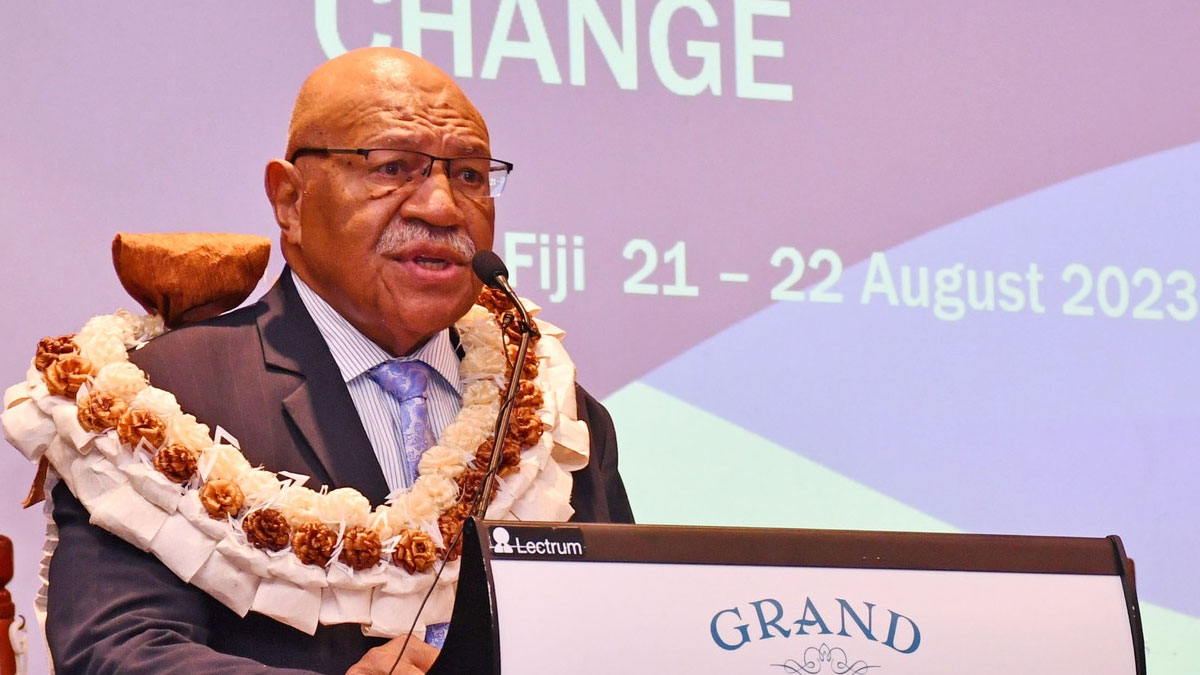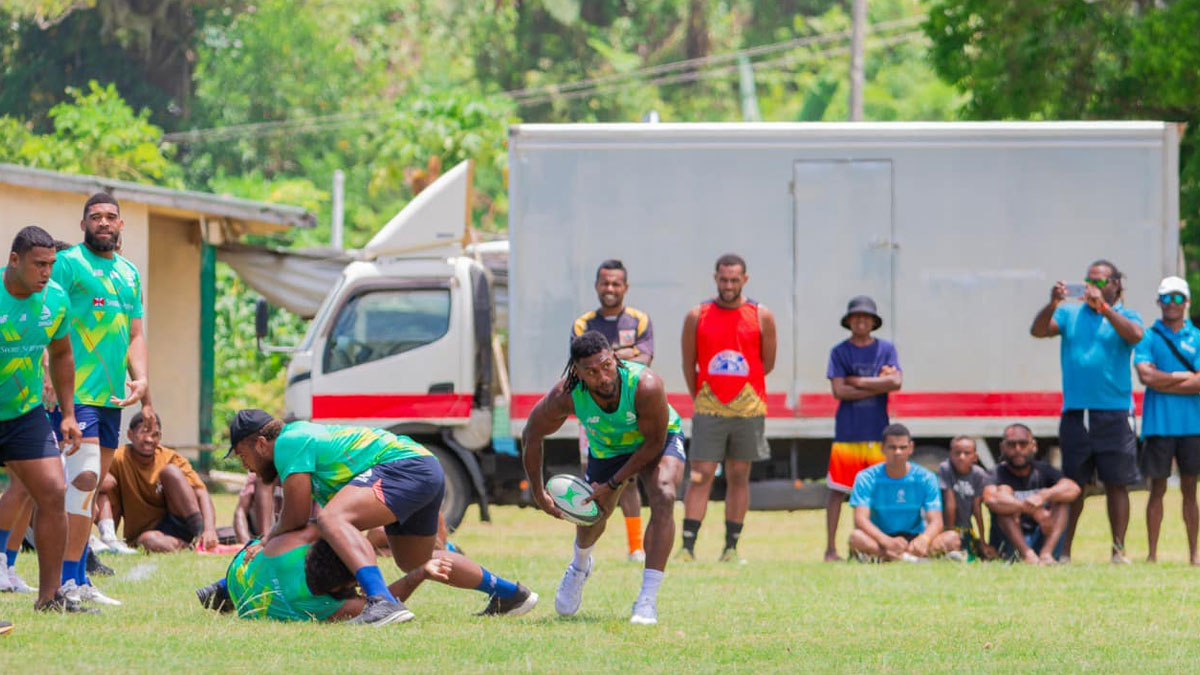
As the calls continue for local and international action to reject the discharging of wastewater from the Fukushima Daiichi Nuclear Power Plant in Japan into the Pacific Ocean, Prime Minister, Sitiveni Rabuka says the controversy is on the agenda of the Pacific Islands Forum.
While speaking during the Pacific Small Islands Developing States High-Level Dialogue On Climate Change, Rabuka said recently he issued a public statement on an environmental issue that has generated much criticism in the region and internationally.
He says he confirmed his support for a report by the International Atomic Energy Agency (IAEA) that the discharge of the wastewater met international safety standards.
Rabuka says he based his views on the science applied by the independent IAEA in its investigations and report.
The Prime Minister says the IAEA is part of the United Nations system.
Rabuka says the safety standards mentioned by the IAEA are reviewed annually by the UN General Assembly, based on estimates by the UN Scientific Committee on Effects of Atomic Radiation. He says the standards also include recommendations from independent, non-government group the International Commission on Radiological Protection.
The Prime Minister says his decision to endorse the IAEA findings was taken by him as a Prime Minister’s prerogative.
He says those who oppose the position he has taken are obviously entitled to their viewpoints.
However Rabuka urges them to consider the science involved.
He says one of his critics at the weekend appeared to be somehow connecting the wastewater discharge with the cataclysmic power of the nuclear bombs dropped in the Pacific as part of weapons testing.
He says that, to him, is fear mongering.
Rabuka says it’s impossible to compare those nuclear tests, with the careful discharge of treated wastewater from Fukushima over a period of approximately 30 years.
He says the material he has read says a commercial type power reactor simply cannot, under any circumstanced, explode like a nuclear bomb.
Rabuka says the data he has read emphasizes that nuclear power stations do not produce greenhouse gases like carbon dioxide and methane.
He says the Society for Radiological Protection has 2000+ members and is the principal independent professional body in its area of expertise.
Rabuka says outside the USA, it’s the largest organization of its kind in the world.
He says it asserts that there should be no concern that the wastewater discharge operations could in any way affect human health or the environment.
Rabuka also says there are constant references to the plans for the wastewater to be “dumped” in the Pacific. He says that creates the wrong impression.
He says it is to be discharged - into Japan’s own backyard, 7306 kilometres from Fiji.
Rabuka has not answered questions sent by fijivillage News, and we are also awaiting comments from the Pacific Islands Forum.
However the Fiji NGO Coalition On Human Rights is calling on Prime Minister Rabuka, the Pacific Islands Forum Secretariat and development Institutions and all Pacific people to reject Japan’s plan to dump Fukushima Nuclear Waste Water into the Pacific Ocean.
They say the Pacific should exercise all international legal means possible to stop this massive ecological injustice, and to stop any capitulation to Japan on the basis of one highly-politicised report from International Atomic Energy Agency that has its own problematic founding principles as a "promoter of peaceful uses of nuclear energy".
The NGO Coalition has stated that it is extremely disappointed with the stance taken by Rabuka supporting Japan’s plans.
The NGOs say this proposed action by Japan is a violation of the human rights of all people of the Pacific and all those who live in the quarter of the Earth's surface covered by the Pacific Ocean.
They also welcome the clear stance of UN Special Rapporteurs Marcos A. Orellana, Special Rapporteur on toxics and human rights, Michael Fakhri, Special Rapporteur on Right to Food and David Boyd, Special Rapporteur on human rights and the environment, who have all publicly expressed deep disappointment and strong concerns on the impact of Fukushima waste dumping in the Pacific, which Japan has said will start even as early as this month.
The Coalition believes that despite this nuclear waste dumping being deemed safe by the International Atomic Energy Agency (IAEA), the magnitude of the threat is massive to humans and marine life and the livelihood of millions of Asia and Pacific people who depend so much on our ocean resources, and with consequences for the global food system.
The Fiji NGO Coalition says the IAEA report is not an adequately independent assessment of the Fukushima plan.
They also stand in solidarity with all other organisations and social movements calling for an immediate end to the Japanese dumping plan that directly violates the Rarotonga Treaty declaring the South Pacific as a nuclear free zone.
The NGO Coalition on Human Rights reiterates that is a coalition of civil society organisations that works towards a Fiji that respects and protects human rights and fundamental freedoms within the framework of the rule of law.
Article 7 of the Rarotonga Treaty covers an obligation as state parties to the treaty to prevent nuclear dumping in our territories.
The NGOs say this nuclear wastewater dumping plan by Japan also contradicts Japan's own obligation under the United Nations (UN) Convention on the Law of the Sea directly violating Articles 192 and 195 and nearly all the articles in Part 12 which addresses the protection and preservation of the marine environment.
They say we must make a stand and demand for redress by the International Tribunal for the Law of the Sea.
They also appeal to our Pacific neighbours to stand with us and urge the UN General Assembly to listen to our plight and call on the support of China, Korea, New Zealand, Australia, and other countries to demand for an urgent UNGA Resolution at the next General Assembly to stop this errant plan.
The NGOs say earlier this year at the 3rd Pacific Feminist Forum, more than 150 diverse women and girls from around the Pacific region collectively stated that the Pacific feminist movement strongly recommends rejecting and fighting the proposal of Japan to release 1.3 million tonnes of treated nuclear wastewater into the Pacific Ocean.
The NGO Coalition says the claims that this is safe, are scientifically unfounded and they will resist this for ourselves and our Wansolwara (the Pacific as one ocean and one people)".
They say this is the time for a firm national and regional stance of Pacific governments, including our own in Fiji and on behalf of our people, to stop Japan from dumping Fukushima nuclear wastewater into the Pacific Ocean.
Stay tuned for the latest news on our radio stations


